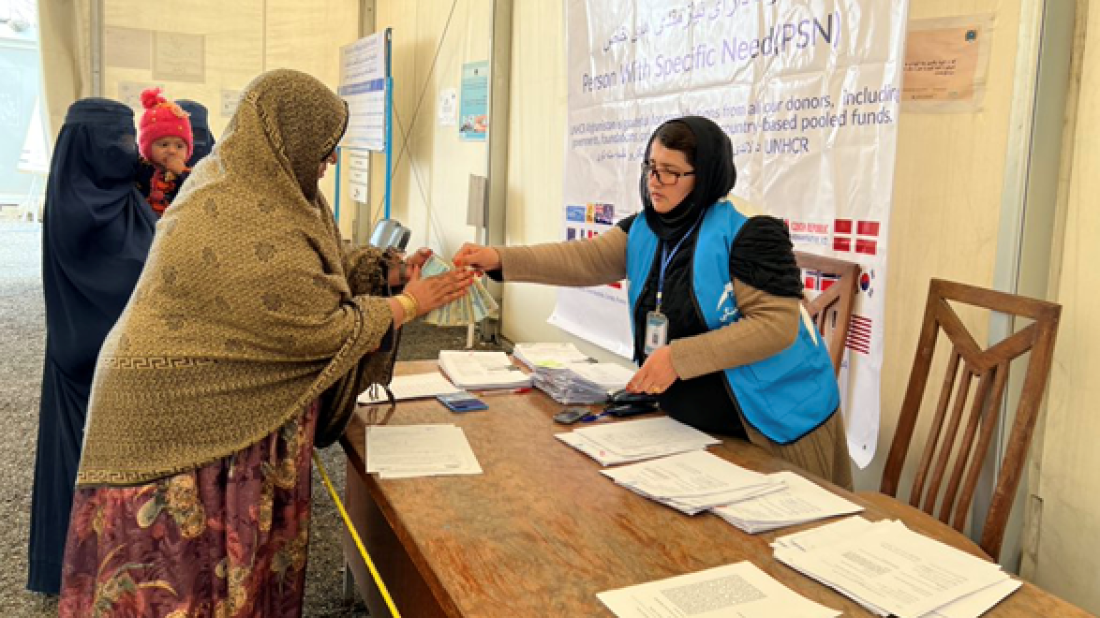Trump calls Israeli president ‘disgraceful’ over Netanyahu pardon refusal
U.S. President Donald Trump said Israeli President Isaac Herzog is “disgraceful” for not granting a pardon to Prime Minister Benjamin Netanyahu, a...

The United Nations High Commissioner for Refugees (UNHCR) announced that it has temporarily suspended activities at its returnee encashment centres across Afghanistan, after de facto authorities ordered Afghan female staff not to work.
In a statement released on Thursday, the UN commission said that its women employees had been refused access to some of its locations across the country.
“Security forces are visibly present at the entrances of UN premises in Kabul, Herat, and Mazar-i-Sharif to enforce the restriction. This is particularly concerning in view of continuing restrictions on the rights of Afghan women and girls,” the statement said.
The encashment centres (EC's) provide cash support and other assistance to Afghans returning after years of displacement and exile. According to UNHCR, 52% of returnees are women, meaning female staff are essential to interviewing and supporting them.
Arafat Jamal, UNHCR’s Representative in Afghanistan, said the suspension was unavoidable.
“We are working towards a solution that will enable female aid workers to assist female returnees, and are hopeful for a speedy and pragmatic resolution, in collaboration with the authorities. Meanwhile, we have been forced to temporarily suspend activities.” Jamal said.
Roza Otunbayeva, Head of the United Nations Assistance Mission in Afghanistan (UNAMA), raised the issue directly with Foreign Minister Amir Khan Muttaqi in Kabul during a meeting with diplomats.
She urged the authorities to lift restrictions, stressing that the situation is “unacceptable”, and asked Muttaqi to take personal responsibility.
“Our national women staff can’t come to the UNAMA office to work, to do this rescue work. I think this is unacceptable… We want your personal involvement and help to make our work possible,” she told the minister.
The suspension risks deepening humanitarian crisis in an already vulnerable country.
The UN estimates that more than 29 million people in Afghanistan require aid, with women and children disproportionately affected.
Analysts have warned that cutting women staff from humanitarian operations could leave millions without access to essential services such as food, shelter, and health care.
UNHCR stressed that its priority remains the safety and security of staff, “particularly among our female staff, and at the same time, supporting the humanitarian needs of displaced and returning Afghans, as we have done for four decades.”
Afghan authorities have not yet issued a formal response to UNHCR’s announcement.
A senior adviser to Iran’s Supreme Leader said on Tuesday that negotiations with the United States must remain focused on the nuclear issue and be grounded in realism, as Washington and Tehran prepare to resume talks mediated by Oman.
James Van Der Beek, who rose to fame as Dawson Leery in the hit teen drama Dawson’s Creek, has died aged 48 following a battle with stage 3 colorectal cancer.
Canadian Prime Minister Mark Carney said a bridge project linking Canada’s Ontario province with the U.S. state of Michigan would contribute to cooperation between the two countries.
U.S. President Donald Trump and Prime Minister of Israel Trump hosted Netanyahu for closed-door talks focused on negotiations with Tehran, Gaza and wider rBenjamin Netanyahu ended a two-and-a-half-hour meeting at The White House on Wednesday without reaching agreement on how to move forward on Iran.
Mexican Alpine skier Lasse Gaxiola will have his mother for company on his Olympic debut but she will not be cheering him from the finish area in Saturday's giant slalom in Bormio because she will be three hours away preparing her own race.
U.S. President Donald Trump said Israeli President Isaac Herzog is “disgraceful” for not granting a pardon to Prime Minister Benjamin Netanyahu, adding that he “should be ashamed of himself”.
Ukraine’s allies have pledged nearly $48bn in military support at a meeting of the Ukraine Defence Contact Group in Brussels, vowing to intensify pressure on Russia and strengthen Kyiv’s battlefield position.
Medical group accuses paramilitary force of targeting civilians in al-Kurqal area, urges international action to protect residents.
Day 6 of the Milano Cortina 2026 Winter Olympics brought fans and photographers unforgettable moments of athleticism, determination and sheer joy. From the ice rinks of Milan to the snowy slopes of Livigno, athletes pushed themselves to the limit delivering breathtaking performances.
U.S. border chief Tom Homan said on Thursday (12 February) a federal immigration crackdown in Minnesota will end after months of raids that led to more than 4,000 arrests, mass protests and two fatal shootings.
You can download the AnewZ application from Play Store and the App Store.

What is your opinion on this topic?
Leave the first comment